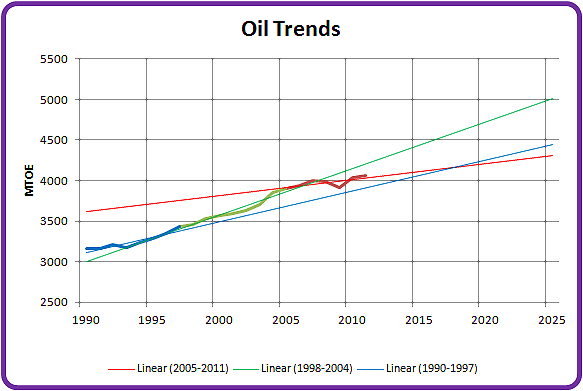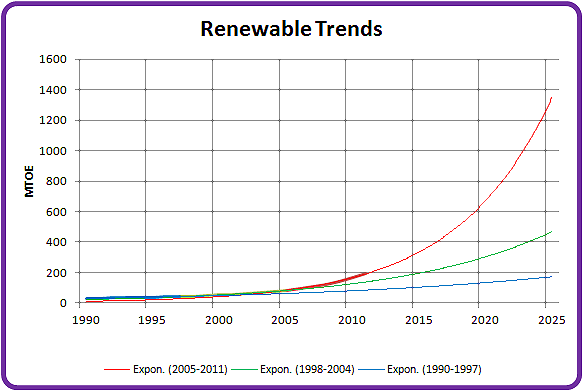Shifting trends in recent global energy use
This post looks at how trends in global energy use have shifted over the last 20 years.
The technique I used was to take recent data from BP (from 1990 to 2011) and fit trendlines over different time periods. I looked at three intervals: 1990-1997; 1998-2004; and 2005-2011. If the trend has not changed much over time, the trend lines will be tightly clustered. If it has changed, the trend lines show how it shifted.
In all cases but one I used linear trend lines. The red lines show the most recent trend based on six years from 2005-2011. The trend lines all run out to 2025, not to give a forecast but simply to make the shift in recent trends more visible. The intent of this exercise is qualitative rather than quantitative.
The first three sources - gas, coal and hydro - all show relatively small, incremental changes in their trends.
The trend of increasing gas use has not changed by much. It's a bit steeper recently, but not a lot, and the rate of increase has been fairly steady since 1998:

The use of coal has obviously increased since 2002. This shift bears watching over the next 5 years:

After a pause in the first half of the last decade, the trend in hydro use has resumed its slow but steady increase:

The next three energy sources all show more interesting changes in their trends.
With oil use the effect of hitting the peak plateau in 2005 is obvious. After a significant increase in the first half of the last decade, in 2005 the rate of increase slowed down dramatically:

The trend in the use of nuclear power has consistently fallen, and over the last six years has gone clearly negative. Based on these trends we can probably expect the use of nuclear energy to fall off more and more rapidly over the next decade:

Renewable energy was the only source where I shifted to a different trend line. I used an exponential instead of a linear fit because the data so obviously cries out for it. What's interesting is that the acceleration of the trend over time is so smooth, and mirrors our intuition quite well:

Nuclear power looks like it's entering the twilight of its life, not a moment too soon. And with hydro firmly entrenched, that leaves the main event as the struggle between wind power and and fossil fuels.
A lot depends on what happens to global capital markets and national energy policies over the next five years or so. If the world slides into a depression the adoption of renewable power could be vulnerable. Europe will be the test case for this, as the economies of various renewable energy front-runners crash and burn. the other variable is public attitudes. The American drought this summer may finally be moving the spotlight onto climate change, and that can't help but pave the way for pro-renewable, anti-FF policy changes. Will it be enough, and soon enough? And what will happen to oil-fueled transportation? Time will tell.





